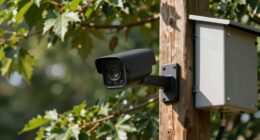RWA NFTs allow you to tokenize real estate assets directly on blockchain platforms, eliminating the need for middlemen like brokers or lawyers. By owning digital tokens linked to physical property, you can buy, sell, or trade property fractions securely and transparently. Blockchain ensures clear ownership records and reduces disputes, while legal frameworks support enforceability across jurisdictions. To understand how these innovations are reshaping real estate transactions, explore more about the legal and technical landscape.
Key Takeaways
- RWA NFTs enable direct ownership and transfer of real estate assets on blockchain, eliminating intermediaries like brokers and lawyers.
- Digital tokens serve as tamper-proof proof of ownership, simplifying property transactions without physical transfer or traditional channels.
- Legal frameworks clarify ownership rights and enforceability, ensuring secure and recognized property interests in digital form.
- Blockchain transparency provides a clear history of ownership and transactions, reducing disputes and increasing trust in the process.
- Compliance with local laws and evolving legal standards facilitate cross-jurisdictional recognition, supporting peer-to-peer real estate trading.

Have you ever wondered how real-world assets are transforming the digital landscape through NFTs? It’s an exciting shift, especially when it comes to tokenizing tangible assets like real estate. RWA NFTs—Real-World Asset NFTs—are changing the game by allowing you to own a piece of physical property in a digital format. Instead of traditional transactions involving brokers, lawyers, and lengthy paperwork, you can now buy, sell, or trade fractions of real estate directly on blockchain platforms. This process hinges on digital ownership, which guarantees that your stake in a property is securely recorded and verifiable on a decentralized ledger. But for this to work smoothly, solid legal frameworks are crucial. These frameworks set the rules for how these digital tokens relate to actual property rights, helping to prevent disputes and ensure that ownership is clear, enforceable, and recognized across jurisdictions.
When you hold an RWA NFT, you’re fundamentally owning a digital representation of a real-world asset. This token acts as a proof of ownership, making it easier to transfer rights without physically moving the property or going through traditional channels. This is especially useful for investors who want to diversify their portfolios without the hefty costs and complications of full property ownership. The blockchain’s transparency means you can verify ownership history and transaction records at any time, providing confidence and security. However, for all this to be effective, legal frameworks must be in place that clearly define the rights associated with these tokens. They should specify whether owning an RWA NFT grants you full property rights, a share of the income generated, or some other form of interest. Such clarity prevents misunderstandings and offers legal protection in case of disputes.
The integration of legal frameworks also facilitates compliance with local property laws and regulations. Different countries have varying rules about land ownership, transfer, and taxation, so these frameworks help bridge the gap between digital tokens and physical assets. This ensures that your digital ownership is recognized and enforceable just like traditional property rights. As the technology evolves, so will the legal landscape, making these frameworks more robust and adaptable. By establishing clear standards and best practices, they promote wider adoption of RWA NFTs and reassure investors that their digital assets are legally sound. In short, the success of RWA NFTs depends on how well legal frameworks can adapt to this new form of ownership, enabling you to confidently participate in a rapidly growing digital real estate market. Additionally, increased awareness about the legal aspects can help foster trust and mainstream acceptance of these innovative assets.
Frequently Asked Questions
How Do RWA NFTS Impact Traditional Real Estate Investment Laws?
You might wonder how RWA NFTs impact traditional real estate laws. They introduce new legal implications by challenging existing property rights and ownership structures. Regulatory challenges arise because laws haven’t fully caught up with blockchain technology, making it unclear how these tokens fit into current frameworks. As a result, you could face legal uncertainties, requiring new regulations or adaptations to make certain RWA NFTs are recognized and protected under the law.
Can RWA NFTS Be Used for International Property Transactions?
You can use RWA NFTs for international property transactions, but you need to ensure cross border regulations and currency exchange issues. These tokens could simplify buying and selling across countries, yet legal and regulatory hurdles remain. You’ll have to navigate differing laws, ensure compliance, and address currency conversions. While RWA NFTs offer exciting opportunities, understanding these complexities helps you make informed decisions in global real estate deals.
What Are the Risks Associated With Investing in RWA NFTS?
When investing in RWA NFTs, you face risks like liquidity risks, making it hard to sell your assets quickly, and legal uncertainties, as regulations around tokenized real estate are still evolving. You might also encounter valuation challenges and potential fraud. Stay informed about changes in laws and market conditions, and consider these risks carefully before committing your funds to guarantee you safeguard your investment.
How Is Property Valuation Handled in RWA NFT Tokenization?
When it comes to property valuation in RWA NFT tokenization, you rely on property appraisal and valuation techniques to determine its worth. Experts assess factors like location, condition, and market trends to establish accurate appraisals. These valuation techniques guarantee transparency and fairness, allowing you to buy, sell, or trade tokens based on a clear understanding of the property’s value. This process helps minimize risks and builds trust in the tokenized real estate market.
Are RWA NFTS Compliant With Existing Financial Regulations?
You might wonder if RWA NFTs comply with existing financial regulations. Currently, regulatory clarity varies across jurisdictions, making compliance complex. Legal frameworks are still evolving to address tokenized assets, so it’s essential to stay informed and consult legal experts. While some regions provide clear guidelines, others lack specific rules, meaning RWA NFTs may not yet be fully compliant everywhere. Always verify local regulations before engaging in tokenization activities.
Conclusion
With RWA NFTs, you can now easily invest in real estate without relying on traditional intermediaries. This innovative approach streamlines the process, making property ownership more accessible and transparent. By tokenizing real estate assets, you gain greater liquidity and control over your investments. Embrace this technology to diversify your portfolio and enjoy the benefits of blockchain-based property ownership. The future of real estate investment is here, and it’s simpler and more direct than ever.









